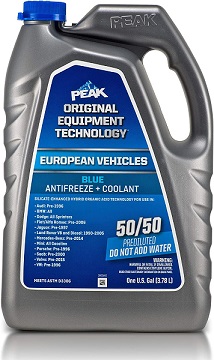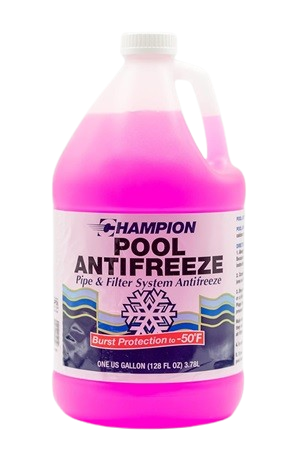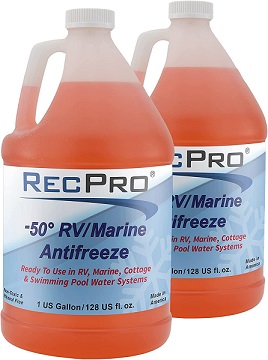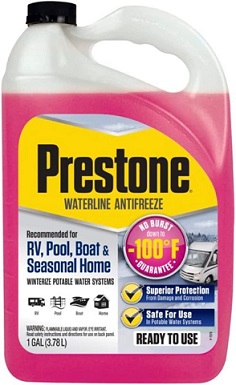Getting your RV ready for winter is crucial to keep its plumbing safe from the harsh cold temperature. However, using the wrong anti-freeze formula can lead to cracked pipes and expensive fixes.
So how do you pick one? To find the best RV antifreeze, we spoke with a bunch of RV enthusiasts and experts in this field. According to them, the below factors are game-changers in choosing the right one.
- Temperature Rating: Select an antifreeze that can handle temperatures below the expected or recorded lowest temperatures of your area. Ideally, it should protect down to at least -50°F to ensure your RV’s water system doesn’t freeze and crack.
- Safety: Choose a non-toxic, biodegradable antifreeze that’s safe for all plumbing systems. Prefer products labeled as “GRAS” (Generally Recognized as Safe) by the FDA.
- Concentration: RV antifreeze comes in two kinds: concentrated (cheaper and longer-lasting but requires dilution before use) and pre-diluted (ready to use but with a shorter shelf life). Pick the one that suits your convenience.
Outline
ToggleBest RV Antifreeze Table
| Best RV Antifreeze | No. of Units | Quantity | Buy Now |
|---|---|---|---|
| PEAK OET RV Antifreeze | 1 | 1 Gallon | Check On Amazon |
| Champion Pool RV Antifreeze | 2 | 1 Gallon | Check On Amazon |
| RecPro RV Antifreeze | 2 | 1 Gallon | Check On Amazon |
| Splash RV Antifreeze | 1 | 1 Gallon | Check On Amazon |
| Garden at Home RV Antifreeze | 1 | 1 Gallon | Check On Amazon |
Best RV Antifreeze Reviews
1. PEAK OET RV Antifreeze
Why it made the cut: Trusted coolant for European vehicles.
PEAK Antifreeze is specially designed to keep your European vehicle’s cooling system running smoothly. With its advanced technology, this coolant provides robust protection against rust and corrosion, safeguarding essential cooling parts. Its compatibility with other extended-life antifreeze/coolants makes it a versatile choice for various vehicle maintenance needs.
This 1-gallon container comes prediluted to a 50/50 ratio, making it easy to use. Plus, it contains a bittering agent called Denatonium Benzoate to prevent accidental ingestion, enhancing safety. Ideal for BMW, Jaguar, Volvo, and other European vehicles requiring a BLUE Silicate-Enhanced Hybrid Organic Acid Technology (Si-HOAT) formula, this coolant ensures your engine performs optimally and lasts longer.
Specifications:
- 1-gallon engine antifreeze/coolant
- Compatible with extended-life antifreeze/coolants
- Designed for European vehicles
- Protects against rust and corrosion
- Prediluted to a 50/50 ratio
- Contains a bittering agent for safety
- Service life protection of up to 150,000 miles or 5 years
- Supports complete flush and fill installation
- Ideal for quick top-offs
- Guarantees optimal performance and longevity
Pros:
- Extended service life protection
- Compatible with various European vehicles
- Prediluted for easy topping off
- Contains a bittering agent for safety
Cons:
- Limited compatibility with non-European vehicles
2. Champion Pool RV Antifreeze
Why it made the cut: Trusted cold-weather burst protection solution.
This top-notch antifreeze from Champion Pool ensures your pipes and plumbing stay safe from bursting, even in freezing temperatures as low as -50°F. Its concentrated formula means you don’t have to dilute it, making winterizing your above-ground or in-ground pool a breeze.
Made in the USA, CPDI Champion Pool Antifreeze is all about quality and effectiveness, preventing costly damage to your pool’s plumbing while maintaining water quality and system efficiency, ultimately saving you money in the long run. Simply follow the instructions for application and enjoy a worry-free winterization process and peace of mind all season long.
Specifications:
- 2 x 1-gallon bottles
- Provides burst protection down to -50°F
- Ideal for pools, spas, and outdoor water systems
- No dilution required
- Suitable for above-ground and in-ground pools
- Made in the USA
- Alcohol-free formula
- Prevents potential plumbing damage
- Supports pool water quality and efficiency
- Easy-to-follow application directions included
Pros:
- Reliable burst protection in cold temperatures
- Concentrated formula for efficient use
- Suitable for various pool styles and sizes
- Made in the USA for quality assurance
Cons:
- Directions to use may not be clear.
3. RecPro RV Antifreeze
Why it made the cut: Premium non-toxic antifreeze solution.
RecPro Antifreeze can handle temperatures as low as -50°F, preventing pipes and plumbing parts from breaking and causing expensive damage. Approved by the FDA as non-toxic, it’s safe for your water system and marine engine blocks.
It helps seals and gaskets last longer by lubricating them. Whether you’re getting your RV ready for winter or storing marine equipment, RecPro RV Antifreeze is a reliable choice that won’t harm your plumbing materials. Count on RecPro to protect your investment and keep your travels worry-free, no matter the season.
Specifications:
- -50°F burst protection
- Non-toxic formulation
- Lubricates seals and gaskets
- Safe for marine engine blocks
- Made from FDA-approved materials
- Compatible with steel, plastic, copper, and brass plumbing
Pros:
- Exceptional -50°F burst protection
- Non-toxic formulation for safety
- Lubricates seals and gaskets
- Compatible with various plumbing materials
Cons:
- May require thorough flushing before use
4. Splash RV Antifreeze
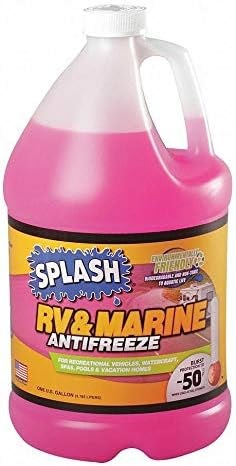
Splash Antifreeze is the perfect choice for safeguarding your RV or marine plumbing systems during cold weather. With a freezing point of -50°F, it ensures that your pipes won’t freeze, saving you from expensive repairs.
Packaged in a handy 1-gallon bottle, it’s simple to use, making winterization hassle-free. Its non-toxic formula is safe for potable water systems and won’t harm your plumbing. Customers love its effectiveness and ease of use compared to other methods. Trust Splash to keep your RV or marine gear safe all year long.
Specifications:
- 1-gallon plastic bottle
- Freezing point of -50°F
- Non-toxic formula
- Safe for potable water systems
- Effective winterization solution for RVs and marine equipment
Pros:
- -50°F freezing point for reliable protection
- Non-toxic formula safe for potable water
- Easy to handle and install
- Effective alternative to blowing out air
Cons:
- Limited availability in certain regions
5. Garden at Home RV Antifreeze
Why it made the cut: Ultimate cold weather protection for water systems.
Protect your RV, pool, boat, or seasonal home from extreme cold with Garden at Home RV/Waterline Antifreeze. This top-notch antifreeze provides outstanding protection with an impressive -100°F freezing point, ensuring your water systems stay functional even in the coldest weather. With its no-burst guarantee, you can rest assured that your investments are shielded from potential damage, corrosion, and rust.
Safe for use in potable water systems, this antifreeze is compatible with commonly found metals, plastic, rubber, and elastomers in water lines. Whether you’re winterizing your RV or closing your pool for the season, Garden at Home RV/Waterline Antifreeze offers superior protection while maintaining water quality. Trust its reliability for worry-free usage in any climate.
Specifications:
- -100°F freezing point
- Safe for use in potable water systems
- Compatible with metals, plastic, rubber, and elastomers
- No-burst guarantee for added peace of mind
Pros:
- Exceptional -100°F freezing point
- Safe for use in potable water systems
- Compatible with various materials
- No-burst guarantee ensures reliability
Cons:
- Slightly higher price.
Factors to Consider When Choosing RV Antifreeze
As winter gets closer, it’s really important to protect your RV’s plumbing system. One key thing to do is pick the right antifreeze. There are lots of choices out there, so it’s important to know what to consider when making your decision.
1. Type of RV Antifreeze Solution
There are two main types: propylene glycol and ethylene glycol. Propylene glycol is the better choice for RVs because it’s non-toxic, making it safer for use in water systems that you might drink from. Ethylene glycol, while it works well, is toxic and should be avoided in RVs, especially if there’s a risk of accidental ingestion.
2. Temperature Rating
This rating indicates how well the antifreeze can handle freezing temperatures. Selecting a product with a suitable temperature rating for your travel or storage location is crucial. Lower temperature ratings offer stronger protection in colder areas, helping to keep your RV’s plumbing safe even during sub-zero weather.
3. Versatility
It’s important to think about how versatile the antifreeze is. Certain RV antifreeze options are made for specific purposes, like winterizing plumbing or safeguarding pools and spas. Choosing a versatile product that works in different situations makes things easier and more cost-effective. You can handle various winterization tasks with just one solution.
4. Environmental Impact
Considering the environmental impact is important. Seek out RV antifreeze options that are eco-friendly and biodegradable to reduce harm to the environment. Opting for environmentally conscious products not only safeguards natural resources but also protects wildlife and ecosystems in the places you visit.
5. Safety Considerations
It’s important to focus on safety when choosing RV antifreeze. Look for products labeled as non-toxic and safe for use in drinking water systems. Always follow correct handling and disposal instructions to keep yourself, your pets, and the environment safe.
Best RV Antifreeze – FAQs
Ans: No, it’s not recommended. RV antifreeze is specifically formulated for potable water systems and is non-toxic.
Ans: It’s not advisable to dilute RV antifreeze as it can affect its freezing point and effectiveness in protecting plumbing systems.
Ans: When used correctly, RV antifreeze is safe for plumbing systems and won’t cause damage.
Ans: It’s generally not recommended to mix different brands of RV antifreeze as they may have different formulations that could react unpredictably.
Ans: Some RV antifreeze formulations are eco-friendly and biodegradable, minimizing harm to the environment.
Conclusion
Selecting the right RV antifreeze is crucial for safeguarding your vehicle’s plumbing during winterization. Consider factors such as its composition, temperature resistance, versatility, environmental impact, and safety precautions. Whether opting for propylene glycol or ethylene glycol, ensure it can withstand the anticipated temperatures and adhere to eco-friendly standards. Proper handling and disposal are essential for safety measures. Equipped with the right RV antifreeze, you can embark on winter excursions confidently, assured of your vehicle’s readiness for chilly conditions. We trust that our suggestions and guide have provided valuable insights for your consideration.
Related Posts:
- How To Keep RV Pipes From Freezing While Camping?
- Find The Best Soldering Iron Temperature For Your Project
- What is a Normal GPU Temp While Gaming?
- What Size Pool Heater Do I Need: Finding the Right…
- Generator Oil Type | How to Choose the Right Oil for…
- Type Of Oil For A Lawn Mower : Choose The Right Type

